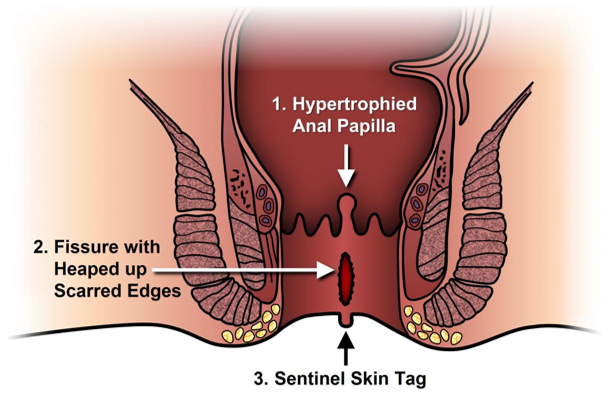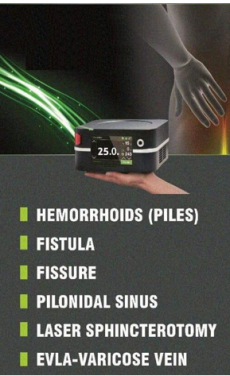Fissure Treatment in Solapur
What is Anal Fissure?

Nirmal Hospital is the best Hospital for fissure Treatment in Solapur we have the best Fissure Doctor in Solapur who excellently handle your problems. An anal fissure is a small cut or tears in the lining of the anus. An anal fissure usually isn’t a serious condition. It can affect people of all ages, and it’s often seen in infants and young children since constipation is a common problem in these age groups.
Anal fissures can occur at any age and have equal gender distribution. Most (85-90%) fissures occur in the posterior (back) midline of the anus with about 10-15% occurring in the anterior (front) midline. A small number of patients may actually have fissures in both the front and the back locations.
Anal fissures may be acute (recent onset) or chronic (typically lasting more than 8-12 weeks). Acute fissures may have the appearance of a simple tear in the anus, whereas chronic fissures may have swelling and scar tissue present. Chronic fissures may be more difficult to treat and may also have an external lump associated with the tear, called a sentinel pile or skin tag, as well as extra tissue just inside the anal canal, referred to as a hypertrophied papilla.
In most cases, the tear heals on its own within four to six weeks. In cases where the fissure persists beyond eight weeks, it’s considered chronic.
Certain treatments can promote healing and help relieve discomfort, including stool softeners and topical pain relievers.
If an anal fissure doesn’t improve with these treatments, you may need surgery. Our Proctologist may need to look for other underlying disorders that can cause anal fissures.
Causes of An Anal Fissure
Anal fissures are usually caused by trauma to the inner lining of the anus. An anal fissure most often occurs when passing large or hard stools. Chronic constipation or frequent diarrhea can also tear the skin around your anus. Other common causes include:
- Straining during child birth or bowel movements
- Inflammatory bowel disease (IBD) such as Crohn’s disease
- Decreased blood flow to the anorectal area
- Overly tight or spastic anal sphincter muscles
In rare cases, an anal fissure may develop due to:
- Anal cancer
- HIV
- Leukemia
- Tuberculosis
- Syphilis
- Herpes
Symptoms of An Anal Fissure
The crack in the skin causes severe pain and some bright red bleeding during and after bowel movements. At times, the fissure can be deep enough to expose the muscle tissue underneath.
- A visible tear in the skin around your anus
- A skin tag or a small lump of skin next to the tear
- Sharp pain in the anal area during bowel movements
- Streaks of blood on stools or on toilet paper after wiping
- Burning or itching in the anal area
Diagnosis of An Anal Fissure
Quite commonly, anal fissures are misdiagnosed as hemorrhoids by the patient or the primary care physician due to some similar symptoms between the two. This delay in diagnosis may lead to an acute fissure becoming a chronic one and, thus, more difficult to treat. Misdiagnosis of an anal fissure may also allow other conditions to go undetected and untreated, such as serious infections or even cancer.
The Proctologist can usually diagnose an anal fissure and sentinel skin tag simply by examining the area around the anus. However, they may want to perform a rectal exam to confirm the diagnosis.
During this exam, if there is no anal spasm, Proctologist may insert a proctoscope into your rectum to make it easier to see the tear and hypertrophied anal papilla.
Anal Fissure Treatment
Most anal fissures don’t require extensive treatment. However, certain home remedies can help promote healing and relieve uncomfortable symptoms. You can treat an anal fissure at home by:
- Using stool softeners
- Drinking more water
- High fiber diet: Taking fiber supplements and eating more fibrous foods, such as raw fruits and vegetables
- Sitz bath: Taking a sitz bath to relax the anal muscles, relieve irritation, and increase blood flow to the anorectal area
- Topical ointments: Applying topical ointment to promote blood flow, to relax the sphincter muscles and healing fissure
- Topical pain reliever: Applying topical pain relievers, such as lidocaine, to the anus to ease discomfort
If your symptoms aren’t relieved within two weeks of treatment, consult our Proctologist for further evaluation. Proctologist can make sure you have the correct diagnosis and can recommend other treatments.
Surgical Treatment
Nirmal Anorectal & Multispeciality Hospital provides the Treatment for Fissure in Solapur handled by best Fissure Doctor in Solapur
LASER LATERAL INTERNAL SPHINCTEROTOMY

“Laser sphincterotomy is the minimally invasive and painless treatment for severe anal spasm in cases of chronic anal fissures.”
If your anal fissure is chronic and fails to respond to these treatments, proctologist may recommend a Laser Lateral Internal Sphincterotomy. This surgical procedure is the painless option and involves making a small incision using core laser fiber in the anal sphincter to relax the muscle. Relaxing the muscle allows the anal fissure to heal.
Excision of Sentinel Tag: If there is a presence of Sentinel Tag along with fissure, excision is done along with the laser lateral sphincterotomy.
Cauterization of Hypertrophied Anal Papilla: If there is a presence of Hypertrophied Anal Papilla along with fissure, Cauterization using laser fiber is done along with the laser lateral sphincterotomy.
At Nirmal Hospital, we have treated over several thousands of patients with this condition without a single complication and with excellent clinical outcome.
Preventive Measure
An anal fissure can’t always be prevented, but you can reduce your risk of getting one by taking the following preventive measures:
- Keeping the anal area dry
- Cleansing the anal area gently with warm water
- Drinking plenty of water
- Eating fibrous foods
- Exercising regularly to avoid constipation
- Treating diarrhea immediately
- Changing infant’s diapers frequently
After the treatment, the nurse will go over few instructions and patient will be given a prescription for few medications and an appointment for a postoperative checkup few days later.

